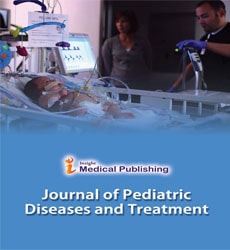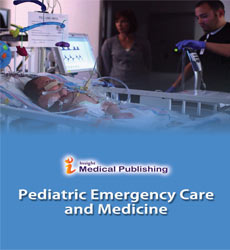Kid Passing Rate Connected to Medical Clinic Readiness for Pediatric Crisis
Sowmya Uttam
DOI10.36648/ippecm.21.6.1
Sowmya Uttam*
Department of Pharmacy, Jawaharlal Nehru Technological University, Telangana, India
- *Corresponding Author:
- Sowmya Uttam
Department of Pharmacy
Jawaharlal Nehru Technological University
RangaReddy, Telangana
E-mail: uttamsowmya11@gmail.com
Received Date: January 18, 2021; Accepted Date: January 20, 2021; Published Date: January 26, 2021
Citation: Sowmya U (2021) Kid Passing Rate Connected to Medical Clinic Readiness for Pediatric Crisis. Pediatr Emerg Care Med Open Access. Vol.6 No.1:1.
Editorial
Basically sick youngsters brought to medical clinic crisis divisions that are not well arranged to think about pediatric crises have multiple occasions the chances of passing on contrasted with those brought to emergency clinics well-prepared to think about them, as per an examination drove by University of Pittsburgh and University of California-Los Angeles doctor researchers.
The discoveries, distributed today in the diary Pediatrics, are the first to give proof from various states connecting the availability of medical clinic crisis divisions to think about fundamentally sick or harmed youngsters with results, and could manage an assortment of strategy reactions.
"Pediatric consideration requires specific gear, preparing and conventions to give the best consideration to youngsters. Acquiring that sort of readiness is exorbitant and tedious," said senior writer Jeremy Kahn, M.D., M.S., teacher in the Department of Critical Care Medicine at Pitt's School of Medicine and the Department of Health Policy and Management at Pitt's Graduate School of Public Health. "Our investigation proposes that endeavors to more readily get ready medical clinics to think about pediatric crises spare lives."
Kahn and his partners acquired information from 426 medical clinics in Florida, Iowa, Massachusetts, Nebraska and New York, on 20,483 fundamentally sick patients age 18 or more youthful who were brought to the clinic crisis office. They cross-referenced the patient results with the "pediatric preparation" of the clinic's crisis division.
Pediatric status is shown by a score appointed after appraisal by the National Pediatric Readiness Project, a quality improvement exertion of a few central government and non-benefit promotion associations. Emergency clinics get higher scores dependent on a few elements, including whether they have gear intended for use on kids, pediatric-explicit conventions for clinical techniques and care, and instructive programming to stay up with the latest on the most recent rules in pediatric consideration. The normalized status score ranges from 0 to 100.
The group separated the medical clinics into four gatherings dependent on their pediatric availability score, with the most reduced quartile's scores extending from 29.6 to 59.3, and the most elevated from 88.2 to 99.9. Medical clinics in the most reduced quartile had a pediatric death rate for basically sick offspring of 11.1%, contrasted with 3.4% for the most elevated quartile.
"Our discoveries show that it makes a difference which clinic a basically sick or harmed kid is brought to in a crisis," said cocreator Jennifer Marin, M.D., M.Sc., a crisis doctor at UPMC Children's Hospital of Pittsburgh and partner teacher of pediatrics and crisis medication in Pitt's School of Medicine. "An emergency clinic's pediatric availability ought to be a factor in deciding to which medical clinic a basically sick kid ought to be shipped."
There likely isn't one ideal answer for the uniqueness in results, noted lead creator Stefanie Ames, M.D., M.S., a pediatrician gaining practical experience in basic consideration medication at UCLA Mattel Children's Hospital and colleague teacher in the Division of Pediatric Critical Care at UCLA David Geffen School of Medicine.
"Would it be a good idea for us to concentrate just on improving the pediatric status everything being equal, conceivably putting cash and assets in medical clinics that once in a while observe kids? Or on the other hand should we accomplish more to guide pediatric crises to medical clinics well-prepared to think about them, possibly expanding transport times?" she inquired. "Some mix will probably be required and potential arrangements likewise could fuse telemedicine and procedures to advance snappy acknowledgment and move of pediatric crises to more arranged clinics."

Open Access Journals
- Aquaculture & Veterinary Science
- Chemistry & Chemical Sciences
- Clinical Sciences
- Engineering
- General Science
- Genetics & Molecular Biology
- Health Care & Nursing
- Immunology & Microbiology
- Materials Science
- Mathematics & Physics
- Medical Sciences
- Neurology & Psychiatry
- Oncology & Cancer Science
- Pharmaceutical Sciences
